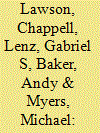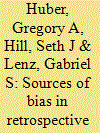| Srl | Item |
| 1 |
ID:
100616


|
|
|
|
|
| Publication |
2010.
|
| Summary/Abstract |
A flurry of recent studies indicates that candidates who simply look more capable or attractive are more likely to win elections. In this article, the authors investigate whether voters' snap judgments of appearance travel across cultures and whether they influence elections in new democracies. They show unlabeled, black-and-white pictures of Mexican and Brazilian candidates' faces to subjects living in America and India, asking them which candidates would be better elected officials. Despite cultural, ethnic, and racial differences, Americans and Indians agree about which candidates are superficially appealing (correlations ranging from .70 to .87). Moreover, these superficial judgments appear to have a profound influence on Mexican and Brazilian voters, as the American and Indian judgments predict actual election returns with surprising accuracy. These effects, the results also suggest, may depend on the rules of the electoral game, with institutions exacerbating or mitigating the effects of appearance.
|
|
|
|
|
|
|
|
|
|
|
|
|
|
|
|
| 2 |
ID:
118970


|
|
|
|
|
| Publication |
2012.
|
| Summary/Abstract |
Are citizens competent to assess the performance of incumbent politicians? Observational studies cast doubt on voter competence by documenting several biases in retrospective assessments of performance. However, these studies are open to alternative interpretations because of the complexity of the real world. In this article, we show that these biases in retrospective evaluations occur even in the simplified setting of experimental games. In three experiments, our participants (1) overweighted recent relative to overall incumbent performance when made aware of an election closer rather than more distant from that event, (2) allowed an unrelated lottery that affected their welfare to influence their choices, and (3) were influenced by rhetoric to give more weight to recent rather than overall incumbent performance. These biases were apparent even though we informed and incentivized respondents to weight all performance equally. Our findings point to key limitations in voters' ability to use a retrospective decision rule.
|
|
|
|
|
|
|
|
|
|
|
|
|
|
|
|